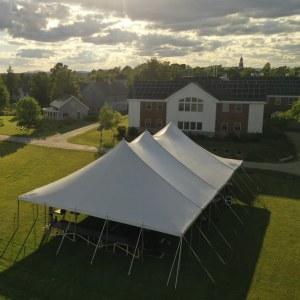State holds up railyard purchase
| Published: 11-24-2023 4:31 AM |
WEST LEBANON — City and state officials are still negotiating responsibilities to manage environmental contamination in Westboro Rail Yard, a former railway property that the city hopes to purchase from the state for recreational use.
The city is working on an agreement with New Hampshire Department of Transportation, or NHDOT, to purchase 6.7 acres of state-owned land along the Connecticut River. The city has a conceptual plan for a 3-acre riverfront park that includes a recreation field and an extension of the trail network.
But first the parties must determine who will be environmentally liable for the property once the railyard changes ownership.
According to a tentative agreement reached last fall, the state would retain responsibility to remove existing hazardous contaminants, except for contamination caused by the city’s actions. The city would be responsible for future contamination of the property.
But in August, NHDOT Commissioner William Cass informed the city that it may be legally difficult for the state to retain environmental responsibility for land that it no longer owns.
“It is not as simple as the state agreeing to maintain all prior environmental liability as the city desires,” Cass explained in a letter to the city. “Typically we would sell property ‘as is’ and valued accordingly. It is very unusual to sell property and retain liability, and the Attorney General notes its hands are largely tied when agreeing to retain liability and potential future cost to the state.”
A city-funded environmental assessment of the railyard earlier this year found high concentrations of hazardous chemicals in the soil and groundwater, including arsenic and TPH, or total petroleum hydrocarbons — a byproduct of diesel oil.
The study, conducted by engineering firm Credere Associates of Westbrook, Maine, recommends covering the contaminated soil at the park site with clean soil, asphalt or other “appropriate barriers” to prevent direct exposure to the contaminants. But should the federal government ever mandate a cleanup of the contamination, the liable party would have to shoulder those remediation costs, according to City Manager Shaun Mulholland.
Article continues after...
Yesterday's Most Read Articles
 Herd departs Hartford’s last remaining dairy farm
Herd departs Hartford’s last remaining dairy farm
 Bald eagles are back, but great blue herons paid the price
Bald eagles are back, but great blue herons paid the price
 At Dartmouth, hundreds protest ongoing war in Gaza and express support for academic freedom
At Dartmouth, hundreds protest ongoing war in Gaza and express support for academic freedom
 Kenyon: What makes Dartmouth different?
Kenyon: What makes Dartmouth different?
 Big drop in tuition and aid is boosting Colby-Sawyer
Big drop in tuition and aid is boosting Colby-Sawyer
“When the state offered to sell us the property, we said that we did not want to be responsible for the (environmental mitigation),” Mulholland said in a phone interview. “We were not going to assume those huge costs.”
The city had initially proposed leasing the land, so that the state would retain ownership responsibility. But the parties later determined that leasing would not be feasible because it would restrict what Lebanon could build on the property, making the city’s plan for a park difficult.
In a phone interview, Cass expressed confidence that city and state officials will create terms and contractual language to move the land sale forward.
“The information we have to date (about the property) doesn’t point to any issues that we can’t work through,” Cass said.
But officials do not know when that agreement will be finalized.
According to NHDOT, the state Department of Environmental Services, or NHDES, requested a retesting of soil and groundwater from the property. NHDOT contracted engineering consultant Stantec to collect that data, which has been sent to the Department of Environmental Services for review.
Shelley Winter, director of Aeronautics, Rail & Transit at NHDOT, said on Tuesday that they do not have a timeline for when that review will conclude.
Mulholland said this process has taken considerably longer than expected. When reaching a tentative agreement last September, state officials had projected that finalizing a sales agreement would only take about nine months, Mulholland said.
“There seems to be no end in sight,” Mulholland said. “It is a little frustrating.”
Once an agreement is finalized, several governing bodies will need to grant approval, including the City Council; the New Hampshire Council on Resources and Development; the Long-Range Capital Planning and Utilization Committee, a House legislative group; the Governor’s Office and the Executive Council.
The city had hoped to construct the park shortly after the upcoming project to replace and widen what’s known as the Dry Bridge, a short span over railroad tracks, south of Seminary Hill, that is on the state’s red-list of bridges that are in poor condition.
Construction of the Dry Bridge is currently scheduled to start in 2025 and finish in 2026.
“It will go out to bid next year, if all goes as planned,” Mulholland said.
Cass said the process is taking longer than usual because of the city’s request to keep the environmental liability under the state’s jurisdiction.
“We just need to do our due diligence,” Cass said.
City requests to acquire the Westboro land date back to the late 1990s. The first major milestone toward an agreement came in 2021, when the city and state collaborated to demolish and remove several deteriorating structures in the rail yard, including the bunkhouse, roundhouse, sandhouse and chimney.
Patrick Adrian may be reached at padrian@vnews.com or 603-727-3216.

 Lebanon moves forward with plans for employee housing
Lebanon moves forward with plans for employee housing Howard Dean weighs (another) run for governor
Howard Dean weighs (another) run for governor Colby-Sawyer president announces plan to depart
Colby-Sawyer president announces plan to depart
